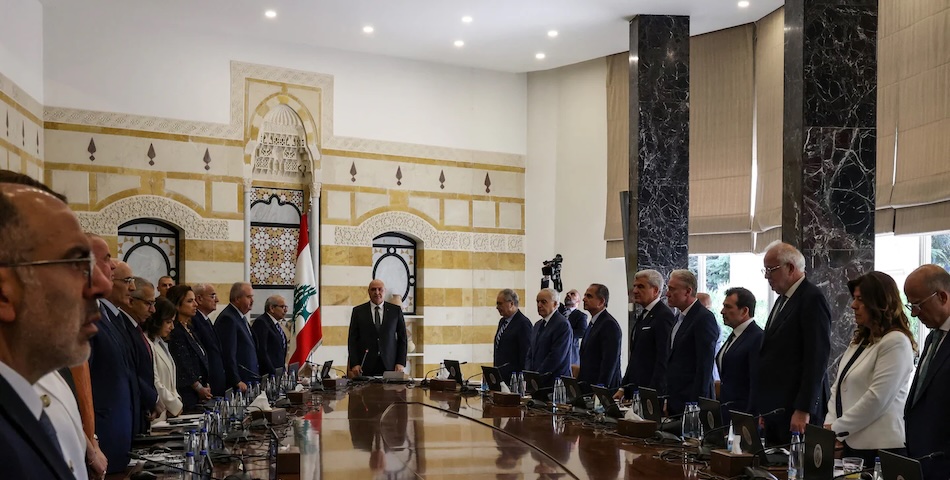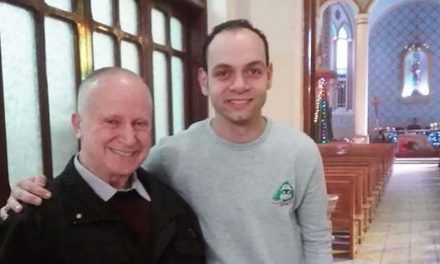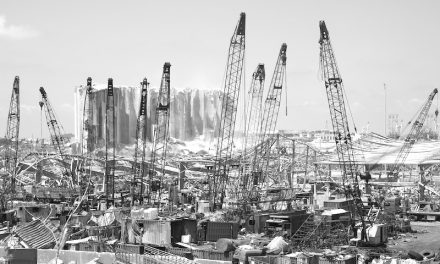Lebanese leadership nets record approval
Will they be able to hold these elections in time even though the country is still partly occupied, frequently bombed, and in a context of massive polarization and constant interference of several countries ranging from the United States to Iran to Saudi Arabia?

© Lebanese President Joseph Aoun, center, heads a cabinet session to discuss an army plan to disarm Hezbollah, at the Presidential Palace in Baabda on Sept. 5. (Anwar Amro/AFP/Getty Images)
After years of chaos, Lebanese leadership nets record approval, poll finds
| By El Chamaa and Klimentov | WASNIGTON POST | September 25, 2025 |
More than 6 in 10 Lebanese adults approved of the country’s leadership, up from 16 percent in 2024. The upswing is one of the largest for a government in 20 years.
BEIRUT — Months after the election of a new president, the formation of a new government and a shaky ceasefire with Israel, confidence among the Lebanese in their government has leaped by 46 percentage points compared to last year, according to a new poll released Thursday. The swing marks one of the largest jumps in approval for a government in 20 years of Gallup conducting the World Poll.
A positive outlook would have been near unthinkable a year ago. The country, mired in one of the world’s worst political quagmires, lacked a president for more than two years, even as war between Israel and Hezbollah, the Iranian-backed militant group and political party, devastated the country and eroded access to essential services. The 2020 Beirut port explosion, which killed 218 people and injured thousands, led to outbursts of anger and demonstrations against the dysfunction of successive Lebanese governments.
Now, more than 6 in 10 Lebanese adults (62 percent) approve of the country’s leadership overall, up from 16 percent in 2024, according to the poll fielded in May and June. Specifically, President Joseph Aoun’s approval rating was 81 percent and Prime Minister Nawaf Salam’s was 56 percent. Both were elected in January.
Meanwhile, 35 percent of Lebanese adults disapprove of the country’s leaders, representing a roughly 40-point drop from 2024. Overall, the results mark just the second time in 20 years of Gallup polling that Lebanon’s leaders have notched higher approval than disapproval ratings.
The results come with a caveat: Gallup’s pollsters, who interviewed 1,002 adults in Lebanon in person, could not access areas that Gallup described as “under the strict control of Hezbollah.” Gallup noted that the excluded areas account for “approximately 10% of the country.”
“The great majority of those respondents are likely to be Shia, but not all. There would be Christian minorities in some of those areas to a small degree, for example,” said Jay Loschky, Gallup’s regional director for the Middle East and North Africa, referring to people in the areas controlled by Hezbollah, where interviewers “previously have not been welcome.”
Lebanon’s new leadership has had a delicate relationship with Hezbollah. The group acquiesced to the election of Aoun as president and Salam as prime minister after several setbacks in the past year. A stinging war with Israel wiped out most of its senior leadership and wrecked its base — and prompted destructive Israeli attacks on Lebanon. The group also lost a key transit route through Syria for resupply from Iran after the fall of the Assad regime in December.
Both Aoun and Salam have signaled that the state should have a monopoly over weapons. In August, the cabinet made a decision — boycotted by Hezbollah’s ministers — to task the Lebanese Army with drawing up plans to disarm all non-state actors in Lebanon, much to the ire of Hezbollah’s leader, Naim Qassem. Earlier this month, several Palestinian factions in Lebanon surrendered three truckloads of weapons to the Lebanese army.
Aoun boasts majority support across all religious groups reported in Gallup’s polling: 91 percent of Christians, 87 percent of Druze, 78 percent of Sunni Muslims and 52 percent of Shiite Muslims approved of his leadership. Aoun, a general and commander of the Lebanese armed forces, was the American favorite for president. He received wide praise after he pledged to fight corruption and said he would not tolerate any armed presence in Lebanon other than that of the state.
Salam enjoys majority support from all groups but Shiite Muslims, of whom only 11 percent approve of his work.
Karim Emile Bitar, a professor at Saint Joseph University in Beirut, said that the Lebanese are reacting favorably to the new government’s plans to ensure the state’s right to monopolize the bearing of arms across the country.
“Large segments of the Lebanese public opinion initially reacted favorably because it’s the first time since 1969 [and] the infamous Cairo Agreement that the Lebanese government is attempting to control its entire territory,” Bitar said.
Beyond Hezbollah’s arsenal, Bitar noted that the government’s newfound favorability is due to more than two years of a presidential vacuum and a former government that “was perceived as incapable of delivering any reform.” The new ministers who make up the current government all have professional experience in their respective fields — unlike previous ones who were just political appointees — with Salam being the former head of the International Court of Justice.
“They do represent traditional parties, but they are trying in their respective portfolios to put in place some badly needed reforms like judicial independence and bank restructuring,” he said.
Despite increasing trust in government, Lebanese confidence in financial institutions remains near all-time lows at 4 percent — the worst performer on that metric among all countries surveyed by Gallup.
Fouad Debs, a lawyer who performs pro bono work on behalf of bank depositors, said that this was due to a lack of reform in the banking sector, with most depositors still locked out of their savings six years after Lebanon’s 2019 financial crisis.
“Today I was with someone at the bank who was asking them to give her back some of her own money to fix her teeth,” Debs said. Depositors can only withdraw a few hundred dollars a month and have to pay excessive fees. The Association of Banks in Lebanon has said the institutions do not have enough liquidity to pay back their clients.
Questions remain whether the government can maintain its support. So far, it has been unable to attract major pledges for aid and investments — necessary for postwar reconstruction efforts — from its wealthy Persian Gulf neighbors. The World Bank estimates that Hezbollah’s conflict with Israel cost the country an estimated $14 billion in physical damage and economic losses. Reconstruction, they estimate, will cost an additional $11 billion.
Debs said that the pace of reforms has been slow. “People’s lives actually have been getting worse; they cannot access basic needs, whether it’s health care or electricity and water,” he said. “With the banks, the issue has not been solved.”
Still, confidence in the integrity of Lebanese elections rose in 2025 to 45 percent, from 17 percent in 2024.
Bitar said the real test of the government’s popularity will come next year, during parliamentary elections. “Will they be able to hold these elections in time even though the country is still partly occupied, frequently bombed, and in a context of massive polarization and constant interference of several countries ranging from the United States to Iran to Saudi Arabia?” he asked.
Compounding the challenges are continued Israeli strikes on Lebanon, which have remained a near-daily occurrence despite the November ceasefire agreed to last year. Even as Lebanese leaders have denounced the strikes, Israel has insisted it is attacking Hezbollah infrastructure.
“The government is relatively popular among those who were expecting reforms, who wanted to open a new chapter, who view the president and prime minister as coming from outside the establishment,” said Bitar. “But this by no means indicates that an overwhelming majority of the Lebanese are satisfied. Most of them, I would say, are pretty anxious about the resumption of Israeli hostilities.”
Klimentov reported from Washington. Emily Guskin in Washington contributed to this report.










CI HANNO SCRITTO